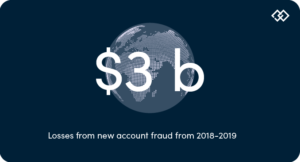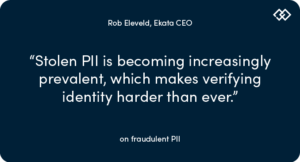Identity Review | Global Tech Think Tank
Keep up with the digital identity landscape.
From financial institutions to consumer brands, industries of all kinds are struggling to fight against the ever changing landscape of identity fraud. This comes at a time where COVID-19 has given fraudsters more opportunities at phishing attacks against consumers all across the globe, as daily activities such as work and communication have now become remote.
“We’re seeing a significant increase in phishing activity by leveraging the pandemic, which allows fraudsters to go beyond their neighborhood and attack the world. So we’re seeing that trend increase, not only against consumers but also against businesses,” said Daniel Cohen, Head of Anti-Fraud Products, RSA Security.
However, growing fraud cases have motivated companies such as Visa, Ekata, RSA and Journey to launch products that combat various aspects of the fraud landscape and give its consumers a better peace of mind.

From 2018 to 2019, new account fraud was up 13%, accounting to over $3 billion in losses each year. Utilizing stolen or synthetic identities to open new accounts, many fraudsters have driven rates of Accounting Opening Fraud.
Back in July, Visa announced Advanced Identity Score, a digital tool to help U.S. financial institutions, a digital tool to help U.S. financial institutions to combat new account fraud. The technology serves to decrease the number of new accounts opened with stolen identities by combining Visa’s artificial intelligence and predictive machine learning capabilities with application and identity related data to generate a risk score for new account applications.
“With more than 14.7 billion data records breached since 2013, many of which include sensitive data such as name, tax ID number, and address, new account fraud has been a consistently growing challenge for financial institutions,” said Julie Conroy, research director, Aite Group. “Financial institutions are looking for solutions that can help effectively detect synthetic and stolen identities at the time of application.”
The technology utilizes its two-digit identity fraud score to make more informed risk decisions, helping to prevent fraud loss at the point of credit application.

Ekata has also utilized machine learning prediction to enable businesses to better identify good and bad customers based on previous insights and flag risky digital transactions. With the release of the Network Score, the new service leverages the Ekata identity Network to increase the precision of fraud detection.
Their Identity Engine helps businesses make risk decisions about their customers by providing data insights on how their information is being used online. Their Identity Network model also continues to learn with new transactions to determine fraud potential.
“With over 20 years of sourcing identity data from our global data providers, we know that authoritative data isn’t enough,” said Rob Eleveld, Ekata CEO. “Stolen personally identifiable information (PII) and fake digital identities are becoming increasingly prevalent, which makes verifying identity in the digital and card not present (CNP) world harder than ever. Fraudsters can try to impersonate and act the way legitimate users do but they will never match 100 percent of the time; those activity patterns can be powerful signals of fraud.”

As the world continues to become more digital, there is a growing consumer demand for simple and secure eCommerce transactions. New digital transformation initiatives introduce threats and vulnerabilities like CNP fraud, which is expected to reach $6.4 billion by 2021 in the U.S., according to Aite Group.
Security solutions provider RSA, recently announced that consumer credit company NewDay has deployed RSA Adaptive Authentication for eCommerce to deliver fraud protection for digital payments and address the requirements of the EMV 3-D Secure protocol. RSA Adaptive Authentication for eCommerce helps card issuers and payment processors prevent more than 95 percent of fraud in card-not-present (CNP) e-commerce transactions.
“At NewDay, our customers are at the heart of everything we do, and as they continue to embrace eCommerce, we are committed to investing in innovation that provides the most secure and seamless experience,” said Allan Kite, Director of Architecture & Solutions.
NewDay has selected RSA’s fraud detection capabilities and expertise to provide a convenient and secure online shopping experience for cardholders. RSA has implemented a solution that is catered to NewDay’s specific regulatory considerations, and is also in line with the Second Payment Service Directive Strong Consumer Authentication (PSD2 SCA) regulation requirements. Powered by the RSA Risk Engine, RSA Adaptive Authentication for eCommerce leverages advanced machine learning to analyze hundreds of risk indicators and silently authenticate genuine cardholders while challenging only a small number of transactions that are high-risk.
The Payment Services Directive (PSD2) requires every e-commerce payment or bank transfer to go through stronger authentication, meaning that users are challenged with these actions through biometrics. However, in the digital eCommerce world, RSA hopes to help companies like NewDay work within the constraints of PSD2 while keeping friction low for consumer payment and reduce fraud rates.
“We fill the role of the Access Control Server, working on behalf of the card issuers to process or analyze transactions for fraud,” said Daniel Cohen of RSA. “Our ACS solution has been in the market for about 15 years now. And the last 10 have been geared toward providing a risk-based and machine-learning-based risk assessment of transactions. And one of the key strengths of our solution is its ability to identify fraud. And in order to achieve that, this cannot create friction for the user.”
RSA hopes to leverage machine learning and AI within not only the fraud detection space, but also the operational elements of it and how it can automate these tasks.
“Thinking about COVID-19 and thinking about the impact that it’s having on businesses, it’s creating an increase in payment volumes,” noted Cohen. “We’re working more remotely, we’re doing our shopping more remotely. When you put all that together, that puts an operational strain on our customers to manage the growing fraud workload.”